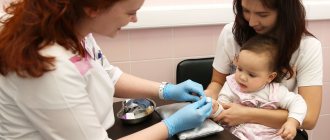Back in Soviet times, from the 1930s to the second half of the 1960s, genetics as a science was banned, and geneticists were persecuted. In a socialist country, it was argued that its citizens could not have hereditary diseases, and talk about human genes was regarded as the basis of racism and fascism.
More than half a century later, ideas about genetics as a medical science and its role in human life have changed significantly, but genetic analysis, karyotyping (determining the chromosome set of future parents), hereditary and chromosomal diseases and other concepts are still a “dark forest” for the common man. And processes such as pregnancy planning and consultation with a geneticist are scary for many couples who want to have a child or are already at the stage of pregnancy.
In fact, genetic analysis when planning pregnancy can help avoid many problems associated with the inferiority of the unborn child.
What is pregnancy planning
Every year planning pregnancy becomes more and more popular.
However, not everyone knows exactly what actions this event includes.
Planning a future pregnancy means the joint preparation of a man and a woman for the process of conceiving a child.
It includes the following actions:
- consultation with a gynecologist for a woman;
- consultation with a therapist for both parents;
- consultation with a geneticist;
- general clinical tests;
- tests to determine blood group and Rh factor;
- tests to determine hidden sexually transmitted infections;
- tests for HIV infection;
- ultrasound examination of the female reproductive system;
- vaccinations.
One of the most important activities is genetic consultation when planning pregnancy.
It can give a prognosis about the birth of a healthy child, based on data on hereditary diseases in the family and stillbirths.
Often pregnancy planning is not given due attention.
It is this step that often provides a high guarantee of successful conception, pregnancy without complications and the birth of a healthy child.
Video
The video below demonstrates the relevance of genetic analysis during pregnancy planning at the present time. Often children are born into families who inherit a number of both less and more serious pathologies.
Timely genetic analysis, as well as consultation with a geneticist, will help prevent the risk of developing many of them. Answers to the most frequently asked questions about whether it is possible to prevent the manifestation of dangerous pathologies in a child?
And what tests should be done before and during pregnancy in order to most likely determine favorable conditions for the birth of a baby will be given by the Deputy Director of the Medical Genetic Center of the Russian Academy of Medical Sciences, Doctor of Medical Sciences V.L. Izhevskaya.
Today, most families approach planning the birth of a child very seriously. This approach is very relevant, since preparation for the most important and responsible status in the life of every person, the status of a parent, requires the closest attention. A mandatory medical examination of future parents, which includes genetic tests (genetic tests),
. Moreover, if some 10-15 years ago so-called “old-parous” women were required to take them, today geneticists rightly believe that such diagnostics should be done even by very young women.
Genetic tests when planning pregnancy
Genetic analysis when planning pregnancy is a multi-step process. At the first meeting, the geneticist talks with the future parents. He asks questions about the pedigree, diseases that occurred in relatives.
Particular attention is paid to couples who have had negative experiences of having children with pathologies or stillbirths.
After an oral consultation with a geneticist, the spouses receive a referral for testing.
First you need to take a biochemical blood test, and then special chromosomal tests.
Both parents undergo these studies.
Genetic tests when planning pregnancy:
- karyotyping (study of the full set of chromosomes of future parents);
- DNA diagnostics (detects individual diseases, prescribed if parents already have sick children);
- HLA typing (genetic compatibility of future parents).
Types of tests for genetic diseases in a couple
Pathologies can be identified using various diagnostic methods. To obtain a reliable picture, a combination of several types of analyzes may be required.
Karyotype analysis or cytogenetic study
Karyotyping is carried out to determine the genome of spouses, i.e. quantitative and qualitative composition of chromosomes. A person’s karyotype does not change throughout life, so this analysis is done only once.
A deviation in the number of chromosomes from the norm towards an increase or decrease can confirm, for example, Down syndrome and other hereditary diseases in parents. Including those that are asymptomatic, for example, Klinefelter and Shereshevsky-Turner syndrome.
Karyotype analysis allows not only to determine the quantitative composition of chromosomes, but also to identify defects in their shape and size, as well as diagnose breaks and other anomalies , etc. Such pathologies of the genome of even one of the spouses lead to the inability to bear a viable fetus or to complete infertility. In addition, damaged genes cause the development of various serious diseases in the unborn child.
Karyotyping is prescribed in the following cases:
- delay in sexual development of one of the future parents;
- amenorrhea in girls over 15 years of age;
- earlier onset of menopause;
- a history of spontaneous abortion in the early stages;
- repeated unsuccessful IVF attempts;
- both spouses are over 35 years old;
- the presence of consanguinity between spouses;
- diagnosis of infertility in one of the spouses;
- oligozoospermia or azoospermia in men.
To carry out karyotyping, blood is drawn from a vein, and the analysis is taken on a full stomach.
Molecular genetic diagnostics
These tests can identify a wide range of hereditary diseases. During molecular genetic diagnostics, the peculiarities of DNA structure are studied.
This is an extensive and diverse group of methods designed to identify pathologies in the structure of a separate section of hereditary material in the form of a sequence of amino acids. Thanks to such tests, a geneticist can diagnose such dangerous diseases as hemophilia, cystic fibrosis, hearing loss and many others.
The most popular among all molecular genetic methods is PCR (polysized chain reaction) diagnostics. This is due to the high accuracy of the analysis results and short execution time. During the research process, a specific section of DNA is selected, which is duplicated many times with the help of special preparations.
Molecular genetic diagnostic methods are the most accurate in determining genetic diseases, and their results are considered the most informative.
The method is based on the fact that the DNA structure of any person does not change throughout life, while every cell of the body contains the same molecule. This allows you to use cells obtained from any part of the body for analysis: blood, buccal epithelium, hair, epidermal particles, etc. can be taken for research.
The advantage of DNA analysis is that the defective gene can be detected before clinical symptoms of the disease appear, as well as in healthy people who are carriers of the gene mutation.
The disadvantage of the study is its relatively high cost.
Watch the video about genetic consultation before planning a pregnancy:
Cytogenetic analysis
This type of research is based on the analysis of chromosome structure using special microarrays that are applied to DNA chips of lymphocytes isolated from the blood. Cytogenetic analysis is used quite rarely, since it takes a long time - the result becomes known only within a month.
But if a woman has a history of repeated episodes of miscarriage or has been diagnosed with infertility, this type of study can be the most informative. In addition, it helps to clarify the diagnosis in children in case of suspected genetic disease.
Cytogenetic research helps to identify the following ailments:
- Translocation of chromosomes, i.e. changes in their structure. Sometimes this is a hereditary pathology, but it can occur during fertilization or during the maturation of germ cells in both men and women.
- Mosaicism of sex chromosomes, i.e. pathological combination of different genetic materials. This anomaly is a symptom of Klinefelter syndrome, Turner syndrome and other diseases.
FISH method (fluorescence hybridization)
This method is used quite rarely in Russian practice, although it has high sensitivity and accuracy. For analysis, a separate chromosome or a segment thereof is used, which are marked with special luminous markers to identify areas with defective genes.
In what cases do they give up?
There are several reasons why you should go for a consultation with a geneticist.
The following couples are at risk:
- the presence of genetic diseases in any of the relatives;
- children who were born earlier had genetic pathologies;
- a man and a woman cannot conceive a child for a long time;
- past pregnancies failed, ended in miscarriage or stillbirth;
- woman's age over 35 years;
- the man is over 40 years old;
- one of the spouses is taking medications that have a detrimental effect on the fetus.
Indications for consultation
You can get advice from a geneticist in both public and private medical institutions. Visit a specialist on your own or with a referral from an obstetrician-gynecologist or reproductive specialist. Prices for a consultation vary from 1,500 to 5,000 thousand rubles, depending on the qualifications of the doctor and the region where the clinic is located.
Despite the fact that anyone can undergo counseling, there are certain indications for mandatory visit to a specialist:
Stages of implementation
At the first meeting, the geneticist will talk with the couple who are planning to become parents.
In order for the consultation to bring maximum results, you need to know what to ask your relatives when going to see a geneticist.
It is imperative to find out whether there have been cases of the birth of sick or dead children in the family, what diseases were found in the pedigree. This information should be told to the doctor.
After studying the pedigree of the future parents, the doctor will give directions for additional specialist consultations and tests, and tell you how to donate blood for genetic testing.
After the first consultation with a geneticist, the couple is recommended to undergo examinations by such specialists as:
- therapist;
- endocrinologist;
- neurologist.
And also take a biochemical blood test.
After this, future parents are sent to undergo direct genetic tests.
They include:
- examination of the chromosome set of each member of the pair for the presence of pathological genes;
- If there is already a sick child in the family, a DNA test is taken. It will show the likelihood of re-birth of a sick child;
- genetic compatibility of spouses. This test is prescribed to couples who have been unable to conceive a child for a long time.
The importance of genetic counseling
Every parent at the stage of planning a child or during pregnancy thinks about heredity and genes. After all, even completely healthy spouses can have a child with pathologies.
Let's remember that each of us has two sets of genes - one from dad, the other from mom. And most simple genetic diseases manifest in a child when one copy of the gene is normal, and the other copy of the gene contains a defect that is responsible for the manifestation of the disease.
The capabilities of modern medicine have reached a level where specialists can determine the likelihood of congenital pathologies and even take the necessary measures to give birth to a healthy child. Sounds reassuring, doesn't it?
To do this, each couple, before conceiving a child, can undergo a consultation with a geneticist. He will give a forecast of the future offspring.
There are a number of relatively simple diseases for which doctors know absolutely exactly which change in the DNA sequence of which gene is responsible for the manifestation of the disease. Moreover, it is known that one such change is sufficient for the manifestation of the disease. For example, these are diseases such as cystic fibrosis, phenylketonuria, sickle cell anemia, etc.
But this does not always mean a verdict. For example, phenylketonuria can be compensated for simply by changes in diet.
But there are also much more severe chromosomal diseases, the nature of which scientists still know much less about and which, unfortunately, are more common. These are polygenic diseases, when not one gene, but several, is responsible for the disease.
If there is a high risk of having a child with severe developmental defects, the specialist will provide information about the need to terminate the pregnancy and, importantly, the consequences of the decision. If you refuse an abortion, it will help develop tactics for managing pregnancy and childbirth in women who have a fetus with developmental anomalies.
Below are examples of chromosomal abnormalities that do not always lead to a natural termination of pregnancy, but allow you to carry and give birth to a child:
I would like to note that conducting research during pregnancy takes a relatively long time, which can lead to late diagnosis of pathologies in the fetus. In this regard, it is important to obtain medical genetic consultation before pregnancy or at its earliest stages, especially if indicated.
Tests for infections
In addition to tests that show the structure of chromosomes and genes, future parents must be tested for a number of infections:
- HIV;
- syphilis;
- Hepatitis B;
- hepatitis C;
- chlamydia;
- herpes;
- mycoplasmosis;
- cytomegalovirus;
- ureaplasmosis;
- rubella.
These diseases can cause significant harm to the development of the unborn child and even cause his death.
Therefore, it is very important to diagnose them before pregnancy and treat them.
Are genetic tests required for both future parents?
Quite often, only the woman in a couple is concerned about the issue of planning a future child. However, this approach is inherently incorrect. Both parents must be tested. This is especially true when it comes to genetic testing.
Hereditary information comes from both parents. And if one of the spouses is healthy, there is a possibility that the second is a carrier of a pathological gene.
To avoid controversial issues in the pregnancy planning process, you need to clearly understand what genetic analysis is, how it is carried out and what its purpose is.
If one of the partners refuses, you should not force him. In such a situation, genetic analysis will no longer be reliable.
Planning a pregnancy is an important step in the life of every married couple. One of the key points is genetic analysis.
Only he can give the couple the answer to the question “What is the probability of having a sick child.” Therefore, you should not skip this step.
A correct and detailed examination helps give birth to a healthy baby.
How much should you trust the survey results?
By conducting a full examination of genetic factors, it is possible to obtain a fairly complete prognosis.
about the possibility of abnormalities in the unborn child due to the structure of chromosomes. The tests also make it possible to identify among the spouses a carrier of genes capable of mutation, which can lead to the birth of a sick baby.
Measurements carried out by specialists allow you to obtain a result measured as a percentage. It is possible to draw a conclusion about a high probability of genetic malfunctions based on an indicator exceeding 20%.
An indicator of less than 10% is the most favorable, indicating the absence of problems with genetics. The average degree of risk occurs when the rate is from 10 to 20%. Despite any results obtained, they cannot be considered a final verdict.
In absolutely all cases, there is a possibility that the fetus will develop according to an unforeseen genetic prognosis pattern. The reliability of the results of this examination lies only in the possibility of identifying risks as factors in the likelihood of a favorable or unfavorable course of a future pregnancy, as well as, if possible, reducing their negative role.










